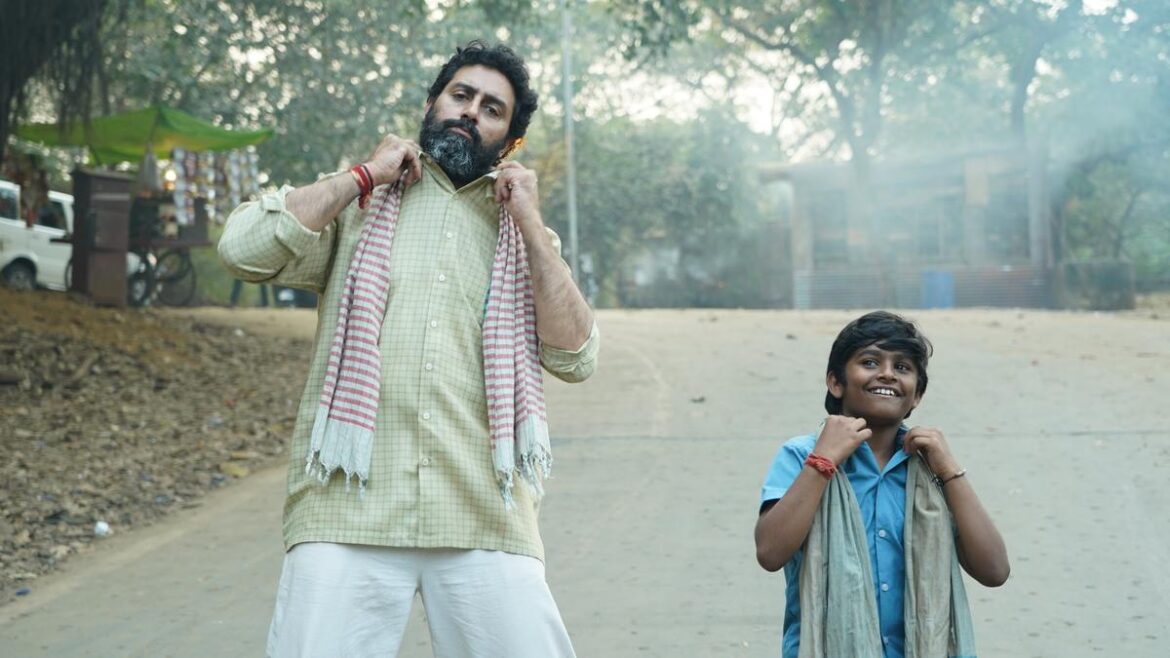Lost And Found:
The 2019 Tamil film KD, was a delightful story of the unlikely bond between an 80-year-old man and an orphaned child, probably inspired by the Pete Doctor’s 2009 animation film Up.
Now Madhumita, director of the award-winning KD, has made a Hindi version, Kaalidhar Laapata, which retains the core of the plot, but changes the main character into a 40-year-old, with an early onset dementia-like mental condition (someone calls it “ameeron ki beemari“). Having Abhishek Bachchan play the part, retains the sweet chemistry between him and the steetsmart kid, but takes away the sting of the social evil of treating old people as disposable. In the original, Karuppu Durai (played by an utterly natural MU Ramaswamy), had been in a coma for three months, when his awful sons decided to kill him by performing a socially sanctioned euthanasia ritual, thalaikoothal. He suddenly wakes up, overhears the plot and runs away, eventually meeting the kid, who teaches him how to lead a carefree existence.
In the Hindi film—which deserves some promotion instead of slinking onto an OTT platform (ZEE5)— Kaalidhar’s brothers, unwilling to bear the cost or trouble of looking after him, take his thumbprint on property documents, and decide to leave him at the Kumbh mela. Then, to pretend that they didn’t do it intentionally, file a missing persons complaint. Kaalidhar hears their plan to abandon him and leaves by himself. But Subodh (Zeeshan Mohammed Ayyub) from the ‘lost and found department’ wants to find him for his own reasons.
Ejected from a bus for not having enough money for a ticket, Kaalidhar finds himself in a strange village, and encounters the chatty Ballu (Daivik Baghela), who was abandoned on the temple steps and lives there, making a living doing odd jobs. However, a few years of school have sharpened his brain and made him literate.
At first irritated by the older man’s intrusion into his space and amused by his passion for biryani, Ballu ends up taking Kaalidhar, whom he renames KD, under his wing. In the Tamil film, the fact of the man’s age is immutable, but there is no way of convincingly conveying KD’s mental deterioration, which, in an earlier scene, a doctor said would get worse, with no solution.
KD and Ballu make a hut, find a way of making money and the kid arranges a regular supply of biryani. They also get work in the local nautanki company. Ballu makes a list of KD’s unfulfilled wishes, and they go about ticking them off – dancing at a wedding, drinking foreign booze, and so on. Their life is a picnic. The question a character asks about what will happen to Ballu after KD does not quite have the same effect, because KD is a seemingly robust 40.
Meanwhile the brothers lose the property document in a fire, and now have to look for KD in earnest, with the help of Subodh.
By making KD younger, it would seem that, like society at large, filmmakers too want to ignore the aged, except, perhaps as a reason for melodrama in films like Baghban. If Amitabh Bachchan was not such a huge star, the role of KD could have been played by him. If the man is 80, there is a sense of time running out, and the urgency to rush through the bucket list. For a younger man, even with his mental fragility, life still offers opportunities—as the film suggests in the end
It’s not that Abhishek Bachchan does not do a good job, considering the limitations of the altered script. He works to bring a kind of baffled innocence to his face, and the slightly tragic air of a man, so weighed down by responsibilities that he never learnt how to really live. The joy on his face when a plate of biryani is placed before him, or when he meets a character from his past, indicates the actor’s sincere investment in the role. Daivik Baghela plays Ballu with a winning zest, and mercifully keeps the precociousness in check. (With no cinema or TV in sight, how does he know Amitabh Bachchan’s dialogues and gestures from old films?)
Kaalidhar Laapata is worth a watch, however, more because clean family viewing films are getting scarcer by the week.
(This piece first appeared in rediff.com)

